During the COVID-19 pandemic, many salaried employees are working from home for the first time. As a result, they are asking whether they can claim home office expenses for tax purposes and what kind of expenses are eligible. They are also wondering whether their employer needs to validate these expenses. Let’s take a look.
Can You Claim Home Office Expenses?
 If you are required to maintain a home office as a condition of employment, you can deduct expenses for the employment use of a work space in your home, as long as you had to pay for them under your contract of employment. These expenses must be used directly in your work and your employer has not reimbursed and will not reimburse them. You must also meet one of the following conditions to claim them:
If you are required to maintain a home office as a condition of employment, you can deduct expenses for the employment use of a work space in your home, as long as you had to pay for them under your contract of employment. These expenses must be used directly in your work and your employer has not reimbursed and will not reimburse them. You must also meet one of the following conditions to claim them:
- Your home office is where you primarily do your work (more than 50 per cent of the time).
- Your home office is used only to earn employment income. You also have to use it on regular and continuous basis for meeting clients, customers or other people in the course of your employment tasks.
See Guide T4044, Employment Expenses, for more information, including the expenses you can deduct.
Guide T4044 also includes Form T777, Statement of Employment Expenses, which is used to calculate allowable employment expenses and must be included with your income tax and benefit return.
What Can You Claim?
As a salaried employee, you can deduct the part of the costs that relate to your home office, such as electricity, heating, water and maintenance. You cannot deduct mortgage interest, property taxes, home insurance or capital cost allowances.
To calculate the percentage of your home office expense that you can deduct, use a reasonable basis, such as the area of the work space divided by the total finished area (including kitchen, bathroom, hallways, etc.). For maintenance costs, if the expenses you paid were to maintain the work space only, you may be able to deduct all or most of them.
If your home office is in a rental house or apartment where you live, deduct the percentage of the rent and any maintenance costs paid that relate to the work space. The amount you can deduct is limited to the amount of employment income remaining after all the other employment expenses have been deducted. This means you cannot use home office expenses to create or increase a loss from employment. Also, you can only deduct such expenses from the income to which the expenses relate, and not from any other income. If you cannot deduct all home office expenses in the year, you can carry forward those expenses and deduct them in the following year as long as you are reporting income from the same employer. Again, it cannot be used to create or increase a loss from employment.
For more information, see Interpretation Bulletin IT-352, Employee’s Expenses, Including Work Space in Home Expenses.
Does My Employer Need to Validate My Expenses?
To be able to deduct expenses for the employment use of a work space in your home on your income tax return, your employer must validate these expenses through Form T2200, Declaration of Conditions of Employment.
This form is issued when these conditions exist:
- There is an employment contract that requires an employee to incur expenses while performing their job.
- The employer has reason to believe that the employee would be eligible to claim deductions on their personal tax return for employment expenses.
The completed form validates that the reported conditions existed even if any reimbursements were made or allowance provided.
You do not have to include the T2200 with your income tax return. However, you must keep it in case the Canada Revenue Agency (CRA) asks to see it. At the time of writing, the CRA has not made any changes to the conditions or requirements around issuing Form T2200 in light of the COVID-19 pandemic.
Are There Any Changes to Note for COVID-19?
During the COVID-19 pandemic, the CRA has announced that payments made by employers to employees to buy equipment to telework are non-taxable up to $500. In principle, an employee receives a taxable benefit when their employer reimburses a personal expense to acquire telework equipment. However, the CRA is prepared to accept that the reimbursement of an amount not exceeding $500, upon presentation of supporting documentation, for all or part of the cost of acquiring personal computer equipment to enable the employee to immediately and properly perform the employee’s work is primarily for the benefit of the employer. Such a payment will therefore not result in a taxable benefit to the employee.
 The Canadian Payroll Association is monitoring for further changes and advocating for employers and employees. As soon as they are informed of any changes or implementation of additional measures and requirements, they will communicate it with their members.
The Canadian Payroll Association is monitoring for further changes and advocating for employers and employees. As soon as they are informed of any changes or implementation of additional measures and requirements, they will communicate it with their members.
This information is an excerpt from the Canadian Payroll Association‘s Dialogue Magazine, which is provided free to its membership. One more great reason to join!
